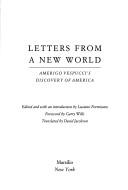
Letters from a new world
By Amerigo Vespucci
Subjects: Sources, Discoveries in geography, Early accounts to 1600, Récits avant 1600, Correspondance, Discovery and exploration, Spanish, Découverte et exploration espagnoles, History
Description: What caused renaissance geographers in 1507 to name the newly discovered continent America, in honor of Amerigo Vespucci, instead of, say, Columbia? The six letters of Vespucci, published in Letters From a New World, convinced Europe of the momentous truth that earlier had eluded Columbus - Columbus had not reached Asia, but a New World, a new continent between Europe and Asia that would bear the name of America. Vespucci's reports contain the astonished and bewildered observations of a man who first made sense of places and things that were, at the time, unimaginable. While Vespucci's voyages are not legendary, his reports of the New World are. Amerigo Vespucci (1452-1512) grew up in Florence during its heyday, in the company of genius - Machiavelli, Vasari and Botticelli. A member of the professional class, he was a scholar, scientist, diplomat, and master of self-promotion. Devoted to serving the Medici banking interests and the courts of Europe, Vespucci traveled as a pilot on the voyages of others, never leading his own, but claiming that some were his own. Despite the controversy surrounding his claims, he ended his career as Chief Pilot for the Spanish crown, a far cry from the disgrace and imprisonment that marked Columbus's final years. The letters of Amerigo Vespucci, one of the founding texts in the history of modern America, are published here in their entirety for the first time in the English language. A selection of renaissance texts, including a letter by Christopher Columbus and excerpts from Bartolome de Las Casas's History of the Indies, provides further insight into the debate around the Florentine navigator's letters. A foreword by Garry Wills puts the debate in perspective for the contemporary reader.
Comments
You must log in to leave comments.